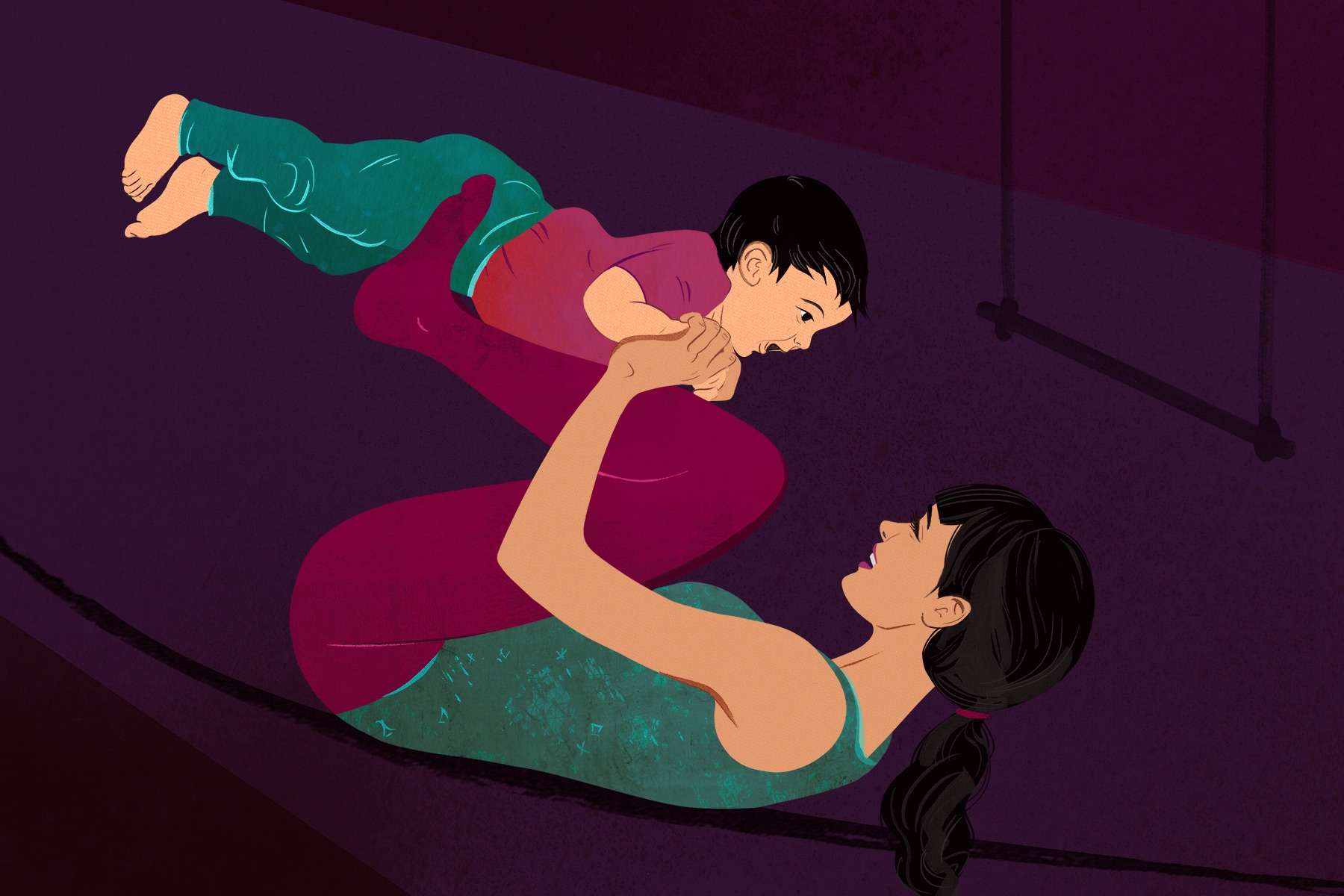Performing and Parenting: Richard Lee
Each month, Courtney Ch’ng Lancaster interviews a local artist to talk about how they manage the tightrope walk that is parenting with a performing arts career that involves no set hours, no guarantee of future income, and no parental leave. Somehow there are lots of moms and dads who manage to be impressive artists and wonderful parents all at once. How do they do it? (You can read Courtney’s past interviews with actress Michelle Monteith, dancer Julia Aplin, and singer Neema Bickersteth.)
My partner and I are getting married this weekend. We’re having a tiny ceremony with our immediate families, and we plan to keep things very casual. Despite the modest nature of our celebration, planning things has still been stressful. It turns out wedding planning is a lot like producing theatre, except with more crying.
It’s been all the more challenging because neither of us have firm ideas about what a wedding should look like. We’re not doing a religious ceremony, we don’t have overbearing parents with big plans, and we don’t have family traditions to fall back on. The wedding is a blank canvas and the lack of restrictions is terrifying.
That said, it is exciting to have the freedom to decide what is important to us, and what isn’t. We can choose to reinvent a very old ceremony, one that is burdened with some dated ideas about gender roles. I love my father very much, but having him ‘give me away’ just doesn’t make sense to me. I don’t think he’d be very comfortable with it either. Instead, my partner and I will find some other way to start the ceremony, together.
This is an approach that we hope to someday extend to parenting as well, an approach that doesn’t involve defaulting to domestic roles as they are portrayed in TV ads for cleaning products. But I don’t expect this balanced approach to be easy, because of the physical realities of childbearing but also because of our own internalized ideas about gender roles. My partner is male, and I’m female, and we’ve inevitably absorbed decades’ worth of potentially unhelpful notions about what a mom and a dad are supposed to be. We’ll have to find ways to unravel those notions together.
It was with these thoughts in mind that I spoke with theatrical polymath and parent Richard Lee. Richard is an actor, sound designer, teacher, fight director, and more. He has recently been seen in Canadian Stage’s Chimerica, and is currently performing in Shakespeare in the Ruff’s Romeo and Juliet. Richard has a daughter with Nina Lee Aquino, the Artistic Director of Factory Theatre. We spoke about their experiences of parenting while balancing two busy arts careers, during a break from Richard’s duties as movement director on Driftwood Theatre’s Taming of the Shrew.

How old is your daughter?
She’s nine.
I’m going to take you back in time a little bit. Can you take me through thinking about having a kid and the decision to go ahead with it? Did you always want children?
I always joke with Nina that I’m a late bloomer. For example, learning manners. You learn manners when you’re nine? I didn’t learn manners until I was fifteen! I’ve just always been a little bit behind in learning things, or so I feel. I met Nina and… she’s the love of my life, but I never really considered having children. I don’t know what it was, it was a real change in desire where all of a sudden I felt a need to have a legacy or a desire to have children, an overwhelming need to make kids. And it happened in and around twenty-eight, twenty-nine. And Nina agreed. We got pregnant so much sooner than we expected, almost as soon as we started trying.
In my last interview, they tried for two years. It’s so unpredictable!
There’s no planning it. If it happens, it happens. And here’s the kicker: we didn’t even know we were pregnant until the first trimester was over. We were so busy—and that’s the thing, as artists we are so busy all the time. We were in the beginnings of making fu-GEN, Nina was still working at Native Earth and transitioning to Cahoots. And then one day we were at a playreading and she said, “I have to go home. I’m gonna throw up. I think you should buy a pregnancy test.” We lived next to a Shoppers and we bought the test and…oh my god, she was pregnant. So the next day we went to the doctor, and they were like, you’re twelve weeks pregnant. No need to worry about that first trimester!
So that just shows you the scope of how busy we were, that we weren’t registering it. I don’t think of myself as an overly ambitious person, but when I look at the signs in our life, when I talk to people about their day-to-day, I’m like…I guess we are overly ambitious, we do pack in a lot in a day. And so, I didn’t know I wanted children until I did, it was instantaneous to me, and then Nina was pregnant, we had our wish. And we had our concerns about money, sure, but…
Did you talk about money before you started trying or did you think things would just work out?
It was scary. You spend your life as an actor barely knowing where your next paycheque is going to come from, whether you’re gonna be able to make rent, whether you’re going to have food this week… All those concerns remain. But—and maybe this isn’t the best mantra to use—but if people in a developing nation can have five kids and live and make it work, then I can make it work too. There will never be a right time to have a baby, there is only wanting it or not wanting it. I never really thought that I would have to give up my profession as an actor, but I thought, “I will work hard to make sure that my family is provided for,” and of course Nina has the exact same desire. My wife is an artistic director, she has somewhat of a steady paycheque, which she works incredibly hard for, and I am very lucky to have a spouse who has my back financially. She’s like, “Of course, if you get a job you get a job but you can also stay at home, take care of our daughter, be the house dad, and I’ll go out there and be the breadwinner right now.”

After your daughter was born, what was that first little while like, trying to figure it out and balance your home life with your work life?
Another example of why Nina is the perfect partner for me. She bought parenting books, she encouraged me to read books that helped me grasp the kind of father I wanted to be. I think I read three different perspectives. So Nina and I, as we often do, picked and chose the methods that worked for us. The preparation was in many ways very exciting and fun—getting the house ready and all that stuff. I’m very lucky because my mom and dad live in the city, they helped out and were really great about supporting us. And friends! That’s the luck that we have, the perfect storm of the things that we have created.
Work-wise, it was an interesting time. We were doing fu-GEN’s second production, and Nina was eight months pregnant, and her water broke during lighting levels, the day before cue-to-cue. Her water broke, and she didn’t tell anyone, she soldiered on for another hour, to get the lighting levels done, knowing that once that was finished, everything else could be handled without her. I think our lighting designer knew, our stage manager was freaking out, bless his soul. Here I was, stapling the set, like, okay I don’t know what’s going on, but I’m just going to keep working, and then I hear, “Richie let’s go.” I get to the car, and I hear, “My water broke.” And before cue-to-cue was done the next day, our daughter was born. We ended up watching the second or third preview.
That image of you stapling the set together and knowing something’s up, but also having such faith in her, that she’s doing what needs to be done, and knows herself and her body, that seems like a theme in the way you talk about your relationship.
We are the perfect pair in many ways. Travelling, for example. Nina is the one with the wanderlust, but I’m the one with the travel skills. So she’s like, Let’s go, and I’m like, Okay, this is how we’ll do it. We are the knife and the fork.
Earlier, you and I talked a bit about the challenges of redefining traditional gender roles as far as home-life is concerned. Can you talk a bit about that?
It’s a very interesting personal struggle that I’ve had. And I’m glad to have someone like Nina who is patient enough to work through it with me. Because it’s hard. I think coming from a traditional Chinese family—and my parents are actually very liberal—but knowing how Chinese culture views traditional roles for men and women.
Along with many cultures.
Along with many cultures! And we’re only fifty, sixty years removed from that reality. It is a very hard struggle, sometimes, to be like, Okay, my wife is the consistent breadwinner in the family. If I have free time my responsibility is taking care of our child. And I struggle with that, there are moments when I do really well and moments when I do poorly.

Do you mean poorly as far as doing it, or feeling it?
Both. But the thing we’ve come to realize is that it’s not about reversing our gender roles, it’s about finding who we are as a couple and how we make this family work. And that was a really hard thing to comprehend. Because I would struggle with not wanting to be the home dad and cook and clean, and yeah, part of that was the male pride of not wanting to be associated with housework, but part of it is that our lives just don’t function that way. We’re freelance artists. Sometimes I can do that for a month, and then I’ve got to do other things, sometimes I can do that for half a day and then I’ve got to do other things. So, really it was about reconfiguring the notion of whose responsibility it was, so that it’s not Nina’s responsibility to take care of the child, or my responsibility to take care of the child, it was OUR responsibility. And so the roles become interchangeable, along with who we are, and where we are in our careers. So, in essence, have I dealt with what it means to have gender role responsibility flipped? If I were to be honest I would say no, but then I would also say that that’s wrong. In this day and age, instead of pushing between being either A or B, it means more to me to understand what we have together in the moment. I think that’s my philosophy for acting too, looking at what we have in the moment, and it’ll be truthful and fun and funny because we’re using what we have instead of what we don’t have.
Is it a constant renegotiation? Do you talk about it, the two of you, or do you see where it goes in the moment?
Talking about it would be putting it nicely! We clash, we have fights like every couple in this world. The thing that I think really makes our relationship work is a desire and willingness to really figure it out at the end of the day. We may not get it in the first argument, or the fifth argument, but… Nina’s really great about recognizing things, and I think I am too, when I get past my own need to gab. I’m telling you all these personal things—but this is relevant!
It sounds like you have an agreement to talk through things even when it’s hard.
And it comes from an unconditional love. I know, no matter how bad an argument gets, that my wife ultimately does love me and I love her. She’ll say ‘So, fine, you’re going away to Stratford for eight months, it’s important to you. Let’s figure out how to make it work’. That’s a really great example, me going to Stratford for eight months, knowing that I would only be able to come back Wednesday night to Thursday morning, and Sunday afternoon to Tuesday morning.

How old was your daughter at that point?
She was three. We hired a nanny who came in and watched her in the evenings when Nina was working, three or four times a week, and again being lucky, my parents were around to help care for her and take some shifts, and we had friends, and we have an army of babysitters. A really big help is having daycare. We are fortunate to get a subsidy from the city of Toronto, which is one of the greatest privileges of being a citizen in this city. It’s a policy of income-based help. When we first put her in daycare, she was in for three months before we received the subsidy. It was brutal. Every single dollar we made was going there, we were barely making ends meet, and then the subsidy came along and it was so helpful, we didn’t feel like we were dying anymore. And we also wanted to have her in an environment where she was socializing, and was stimulated all day, because I can’t give my child the full range of stimulation that eight other kids and a person who is making an effort to educate them can give. So having that daycare, and being good about going to different daycares to choose the daycare that was right for us, was really important.
Was it similar this past year when you were doing Chimerica in Winnipeg?
Nina was able to be at home at night at that point. She’s a wonder woman, man. She was able to manage a busy two months with me not around and make consistent time for our daughter. She was diligent about keeping time with her, making dinners at home, picking her up at school. Again, we’re very lucky to have a group of child caregivers who are available and who love our daughter and understand our situation—and we’re understanding of their situations too. Quite often they’re actors, because there’s a bit more flexibility with their time.
Tell me a bit about your daughter.
She loves theatre, she loves writing more. She like reading books and painting. She and I have contentious conversations about how she loves soccer and I love basketball.

Does she watch your shows?
She’s seen most of my shows. She saw Chimerica and liked it. She thought Evan Buliung was very handsome! She likes acting. She’s done some shows in the city, and at her school. She’s good at it, and yes if she chooses to go into it, she’d be great, but I want her to be a kid, to enjoy living.
Has being a parent changed the work for you, practically and artistically speaking?
I think I want to make the answer more fantastical than it actually is. Has having a child affected my work? Absolutely. It is now a part of my lived experience, which I bring to the work I do, and there are always reminders, like watching how she interacts with the world, watching her level of play, watching her commitment to the emotion… There are all kinds of things that she constantly teaches me about acting. But it’s not like some big floodgate has opened. I think it’s settled me in some ways. Being a dad, the kind of dad I want to be—for the most part, except for the times when you go off the rails—has allowed me to own myself as a person. Which I don’t think I was able to do before.
You mean… confidence?
It’s made my inner eye, my inner mirror, more acute. So, if that inspires confidence, then yes. It’s reality. Everything else in the world could disappear—money, material objects—but I would still have this child. And that is who I am.
Do you have any advice for new dads?
Advice for dads? Feed your child as early as possible! Feeding is such an intimate experience, and sharing in the duty of feeding really involves you. Really, my advice to dads in general is to be involved! Really take on the “traditional” roles and do every one of them. Because I think if you really want to share in the raising of this child, it really has to be both of you. That’s been a more fulfilling way to raise our child, rather than… she raises the child and I’m just sitting back enjoying the fun or whatever. So that’s my first piece of advice. The second is find your own way. There’s no one way to raise a child, there’s no one way to do anything, whether it’s diaper changing or breastfeeding or bottle feeding or whatever. If nothing else out there exists that works for you, then figure it out because it’s your child and it has to work for you, and you will find a way.










Comments